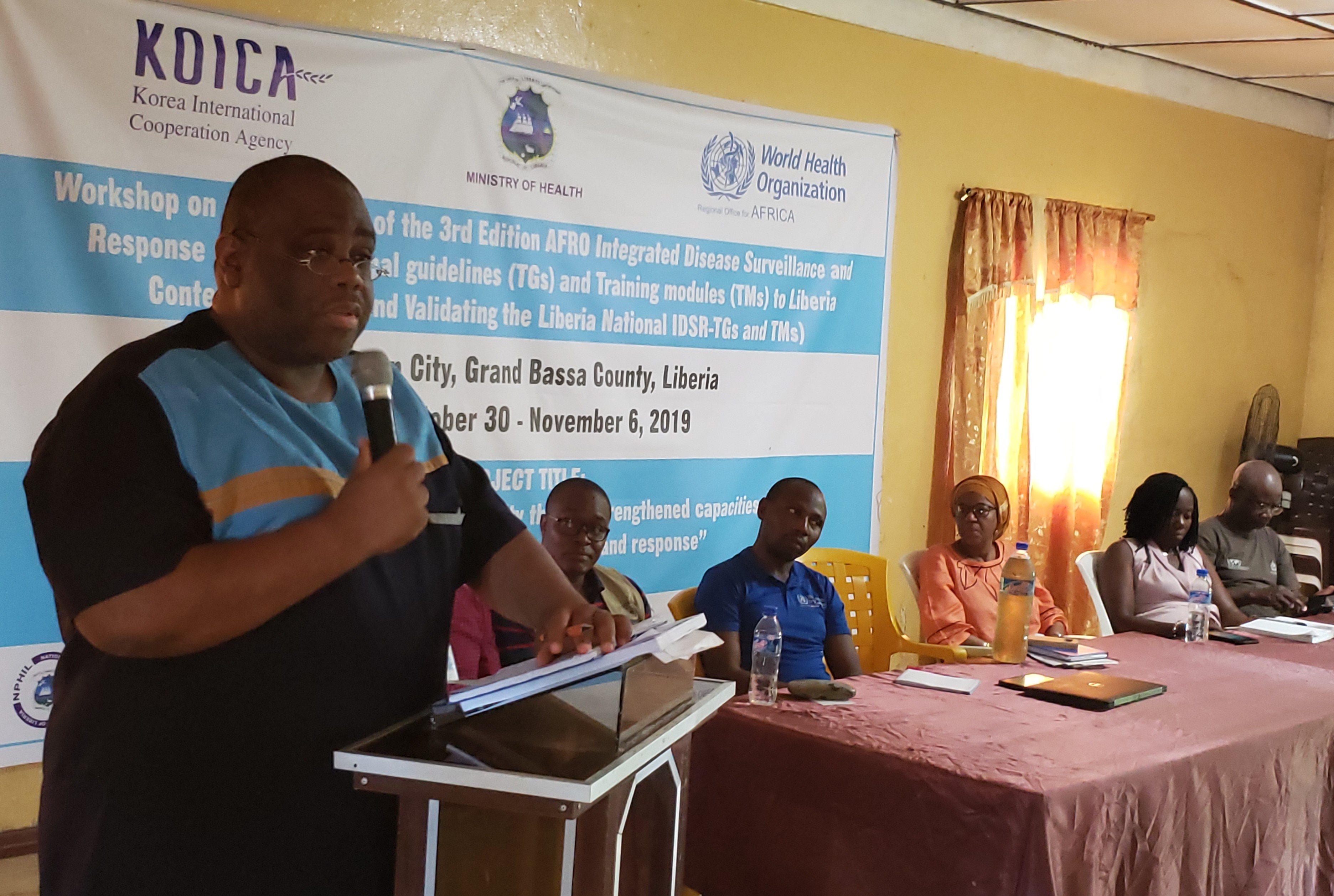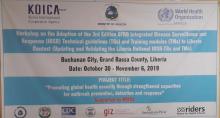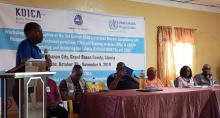Liberia Adapts WHO/AFRO’s 3rd Edition of the Integrated Diseases Surveillance and Response (IDSR) Technical Guidelines
 The unprecedented 2014- 2015 Ebola epidemic affected approximately 10,675 Liberians and had a devastating impact on the fragile health system. Lessons learned from the outbreak enabled the Ministry of Health (MoH) with support from partners to develop an Investment Plan for Building a Resilient Health System (2015- 2021) which placed emphasis on strengthening Epidemic preparedness, surveillance and response as a strategic investment area.
The unprecedented 2014- 2015 Ebola epidemic affected approximately 10,675 Liberians and had a devastating impact on the fragile health system. Lessons learned from the outbreak enabled the Ministry of Health (MoH) with support from partners to develop an Investment Plan for Building a Resilient Health System (2015- 2021) which placed emphasis on strengthening Epidemic preparedness, surveillance and response as a strategic investment area.
Predicated upon this , The World Health Organization(WHO) using the funds from Korean International Cooperation Agency (KOICA) with the objective of strengthening national and international capacities for the prevention, rapid detection and response to all hazards and emergencies with focus on one health approach collaborated with the Ministry of Health (MoH), National Public Health Institute of Liberia( NPHIL) and partners to convene a seven days meeting from 30th October to 6th November 2019 in Buchanan City, Grand Bassa County.
The workshop brought together experts from MoH, NPHIL , Ministry of Agriculture(MoA), National Disaster Management Agency (NDMA), U.S. Centers for Disease Prevention and Control (US CDC), USAID , WHO Country Office and other partners to adapt the 3rd Edition AFRO-IDSR TGs and Training Manuals to the Liberia context, there by updating the 2016 Liberia National TGs and TMs. The guidelines will be used as guide for the country to build a robust disease surveillance system in the context one health and enhance health security in Liberia.
Speaking during the opening of the workshop, Dr. Mosoka P. Fallah, Acting Director General, NPHIL thanked WHO and the other partners for the level of support they continue to provide towards strengthening the country’s Epidemic preparedness, surveillance and response system. He was optimistic, that with the updated National IDSR guideline that focuses on one health approach, the Liberia goal of having a resilient surveillance system will be achieved. He emphasized the importance of the County Health Officers’ participation as the end users of these guidelines, and said it is commendable that they are actively involved from the inception phase of crafting these documents.
In his opening remark on behalf of Dr. Mesfin G. Zbelo, Acting Representative, WCO-Liberia, Dr. Julius Monday Rude, Epidemiologist and World Health Emergencies Cluster Lead, WCO-Liberia, thanked the government; MOH, NPHIL, and other partners for ensuring that the Liberia population is protected against health emergencies. He said, the country has made tremendous improvements in the implementation of IDSR in the country.
Highlighting the remarkable progress that the country has made, Dr. Monday emphasized the need for more guidance. Speaking further, he said , based on the country’s Ebola Virus Disease experience, and the guidance provided in the 3rd Edition of the IDSR Technical Guideline, he is optimistic that the country is the right path to ensure a holistic standard version of the National IDSR Guidelines that will be a robust guide to effectively address all emergencies and moreover serves as a training guide for both pre service and in service health workers throughout the country.
Dr. Monday informed the participants that, WHO is supporting training institutions to include IDRS in their curriculum to ensure that healthcare workers are adequately prepared to address the health issues in the country. He acknowledged the support of KOICA project and called on all partners to ensure that goal of IDSR guidelines becomes a reality. He pledged WHO’s continued support for the country disease surveillance and resilience in other IHR core capacities.
Dr. Fatima Soud, Global Health Senior Advisor, USAID, highlighted her institution’s support to strengthening the health system of the country. She commended MoH/NPHIL for the community health system established through the Community Health Assistants Program. She called for a more visible involvement of the animal and environmental health sectors to strengthen our one health platform.
In his official opening remarks, Mr. Olasford Wiah, Community Health Services Director, MoH said, it is the responsibility of all governments to provide quality health services to the population which requires collaboration and partnership. He thanked WHO and all partners for their tireless support to MoH and NPHIL in ensuring quality and resilient healthcare delivery.
Mr. Wiah said, lot t of lessons has been learnt from Ebola Virus Disease (2014-2015) crisis and it is important for reflections on the best ways to addressing health issues. He emphasized the need for more collaboration, team work and the involvement of key actors, notably the environmental and agriculture sectors in planning public health interventions. He then, on behalf of the Minister of Health Pledged MoH support to NPHIL to ensuring that the health of Liberians is protected.
Other speakers at the opening of the workshop included representatives from GIZ, Samaritan Purse, Riders for Health and a representative of the County Health Officers. All pledged commitment for the implementation of the 3rd Edition of the IDSR Technical Guidelines.
With the generic 3rd IDSR technical guideline now adapted to the Liberia’s context and the 2016 Liberia National TGs updated and validated, it is expected that WHO, NPHIL and partners will now plan the roll out of the adapted and validated document to key professionals in the public and private sectors. For effective roll-out of the IDSR guideline in Liberia, training will be cascaded for health workers at all levels of the health system.
Epi-Surveillance/IDSR Team Lead
WHO-Liberia
+ (231)776106795
drmondayj [at] gmail.com ()
Health Information and Promotion officer
Tel : +(231) 776532008
Email: lakev [at] who.int


